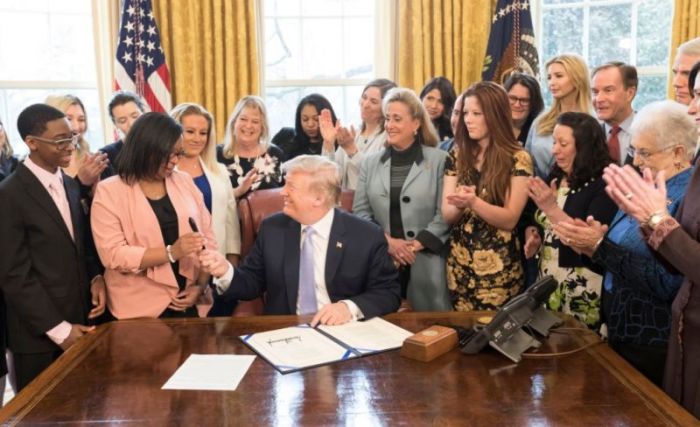Trump Signs Bill Fighting Sex Trafficking Into Law: 'This is a Very Important Day'

President Donald Trump has signed into law a bill with strong bipartisan support that expands the fight against human sex trafficking.
Known as the Fight Online Sex Trafficking Act, or H.R. 1865, President Trump signed the bill on Wednesday morning, with survivors of sex trafficking among those in attendance.
"This is a very important day," stated Trump on Wednesday. "If we work together, we can get the criminal traffickers off our streets and off of the Internet."
"We can bring safety and hope to every community across the country, and we can create a culture that respects the dignity of every child of God."
White House adviser Ivanka Trump took to social media to celebrate the occasion, stating on Twitter that it was "an important day in the fight against human trafficking as this bipartisan legislation officially becomes law."
"Thank you to everyone who gathered at the White House today, and so many others, for your tireless efforts to make this possible," tweeted Ivanka, getting as of Thursday morning over 2,600 retweets and more than 9,000 likes.
Penny Nance, CEO and President of Concerned Women for America, said in a statement released Wednesday that "Evangelical women see this as 'caring for the least of these.'"
"This is a huge victory for all the victims who have been impacted by the compliance, negligence, and intentional exploitation by websites like backpage.com that allowed them to be sold and repeatedly raped," Nance stated.
"Concerned Women for America strongly supported this legislation to the point that we were able to thwart efforts by big-money media to sink the bill."
Covenant House President and CEO Kevin Ryan, whose organization provides services to homeless youth and deals directly with children who have been sex trafficked, celebrated the passage of the bill.
"I joined trafficking survivors with @realDonaldTrump this morning to see vital anti-trafficking legislation finally become law, holding profiteers accountable when they sell kids online. Huge thanks @senrobportman & @IvankaTrump for grit & leadership," tweeted Ryan on Wednesday.
Donna Rice Hughes of the Internet safety advocacy group Enough is Enough called the signing of FOSTA into law a "titantic victory for sex trafficking survivors, law enforcement, and anti-trafficking advocates."
"FOSTA effectively signals the draining of the cyber-swamp of commercial sexploitation by websites who for years have put profit over human dignity and viewed women and children as dollar signs, not as human beings," stated Hughes.
Also known as the Stop Enabling Sex Traffickers Act (SESTA), FOSTA passed in the House of Representatives in February with a vote of 388 to 25 and then in the Senate in March with a vote of 97-2.
"The bill amends the federal criminal code to add a new section that imposes penalties — a fine, a prison term of up to 10 years, or both — on a person who uses or operates (or attempts to use or operate) a facility or means of interstate or foreign commerce to promote or facilitate the prostitution of another person," explained the bill's official summary.
FOSTA was not without its critics, as some tech companies and civil liberties groups argued that the legislation would overreach in its regulation.
"The law would affect any company, organization, or individual that hosts content created by someone else on the internet: social media sites, photo and video-sharing apps, newspaper comment sections, and even community mailing lists," argued the Electronic Frontier Foundation before the bill was passed.
"Small internet startups would become vulnerable to extremely costly legal threats. So would web platforms run by nonprofit and community groups, which serve as invaluable outlets for free expression and knowledge sharing."





























